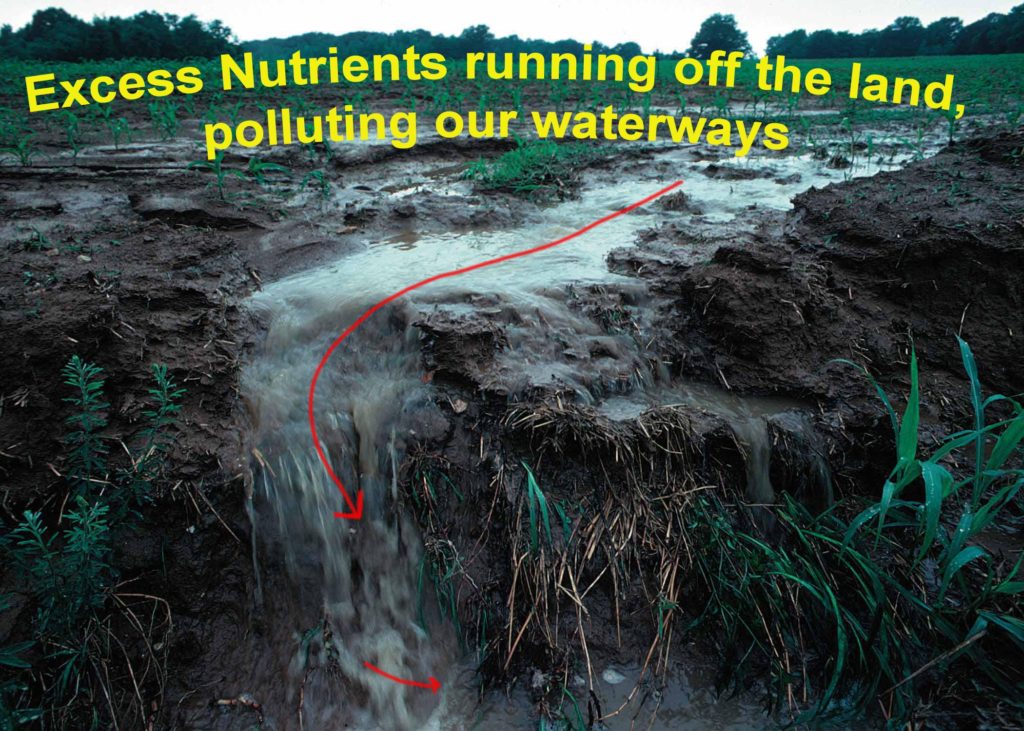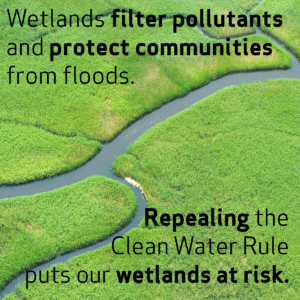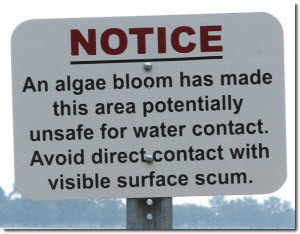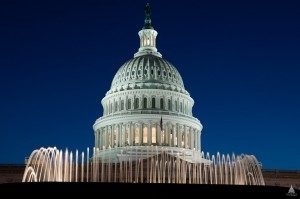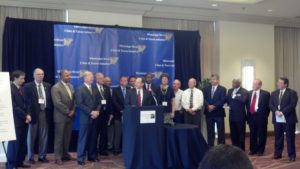Action Center
The Mississippi River flows through the heart of America. For centuries, it has nourished our crops, fostered our wildlife, and sustained our families. Unfortunately, pollution from farms, untreated sewage, and weak enforcement of water laws has caused our mighty Mississippi to deteriorate. Together, we can protect the Mississippi River for future generations.
We are dedicated to providing avenues for all Americans to lend their voice by calling for River protections. Here, in the Action Center, you will find current action alerts as well as past actions. Take a moment to speak up on the River’s behalf and keep checking back for more ways to get involved.
Note: Our website will be under construction in the Fall of 2024. If the links below are not working, please contact us and we’ll be happy to send more information.
When you sign up as a River Citizen you’ll receive our newsletters and updates, which offer events, activities, and actions you can take to help protect the Mississippi River.
You’ll also get our free e-book, Scenes From Our Mighty Mississippi, an inspiring collection of images featuring the River.
Current River Citizen Advocacy Actions
Take the River Days 2023 Action Now!
Take the River Days 2023 Action Now!
Join the movement of everyday people from across the country speaking up for our Mississippi River as part of River Days of Action June 8 – 18th, 2023. This year’s River Days advocacy opportunity calls on Congress to increase protection and funding for vital Farm Bill Conservation Programs. Will you speak up and take action today?
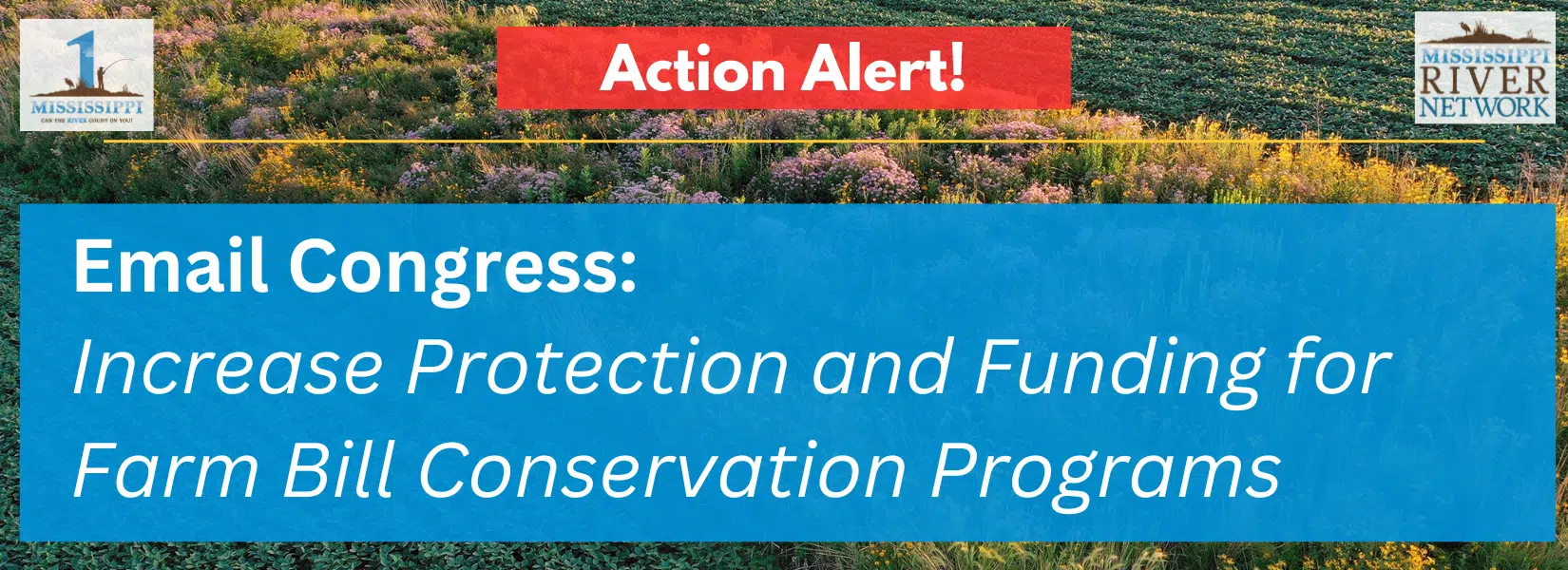
That’s why we are calling on Congress to increase protection and funding for Farm Bill Conservation Programs. These vital conservation programs offer smart solutions that support the local economy and protect people, land, water, and wildlife. But these funds need to be protected and increased to meet the current demand. Make a difference by speaking up and sending an email now!
MORE INFORMATION ABOUT THE FARM BILL AND THIS ACTION
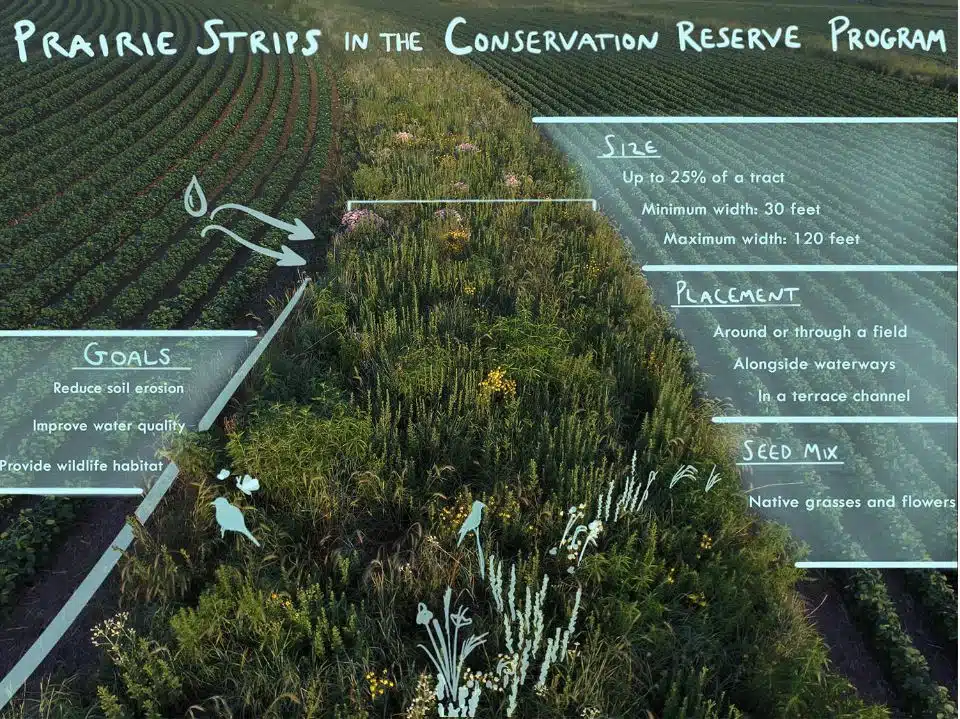
Farm Bill Conservation Programs provide vital environmental protection and employment opportunities in rural America. For example, the pictured prairie strip in an Iowan farm field is supported by a Farm Bill Conservation Program called Continuous Conservation Reserve Program (CCRP). The CCRP pays farmers to install partial field conservation practices to reduce soil erosion and preserve critical wildlife habitats, like wetland buffers, filter strips, riparian buffers, wildlife habitat buffers, wetland restoration, windbreaks, and pollinator habitats. Photo/Graphic credit Omar de Kok-Mercado and Iowa State University STRIPS Program.
Every five years or so since the Dust Bowl of the 1930s, our federal government has debated, passed, and signed a complex bill that drives food and farm policy. From farmer’s markets to farm fields, nutrition to nutrient management plans, and everything in between, each Farm Bill covers a lot of ground. Our current 2018 Farm Bill has guided agricultural policy for the last five years and spent nearly $430 billion dollars on our food and farm system (1). Now, it’s time for Congress to write Farm Bill 2023. Let’s make sure they know – like we do – how this Farm Bill can support our Mississippi River.
While the Farm Bill is a massive piece of legislation, there is one slice that can make a big impact on our waterways — the Farm Bill’s Working Lands Conservation Programs. These programs fall under the Conservation Title of the Farm Bill and account for almost $30 Billion (or 7%) of Farm Bill spending. These voluntary programs help farmers reduce soil loss and mitigate environmental impacts through practices that support healthy soil, flood resilience, and functioning habitats. Farm Bill conservation programs offer some of the most cost-effective solutions available to agricultural and ranching communities. What’s more, farmers up and down the Mississippi River strongly support and benefit from these programs, and there is always far more interest than funding (2).
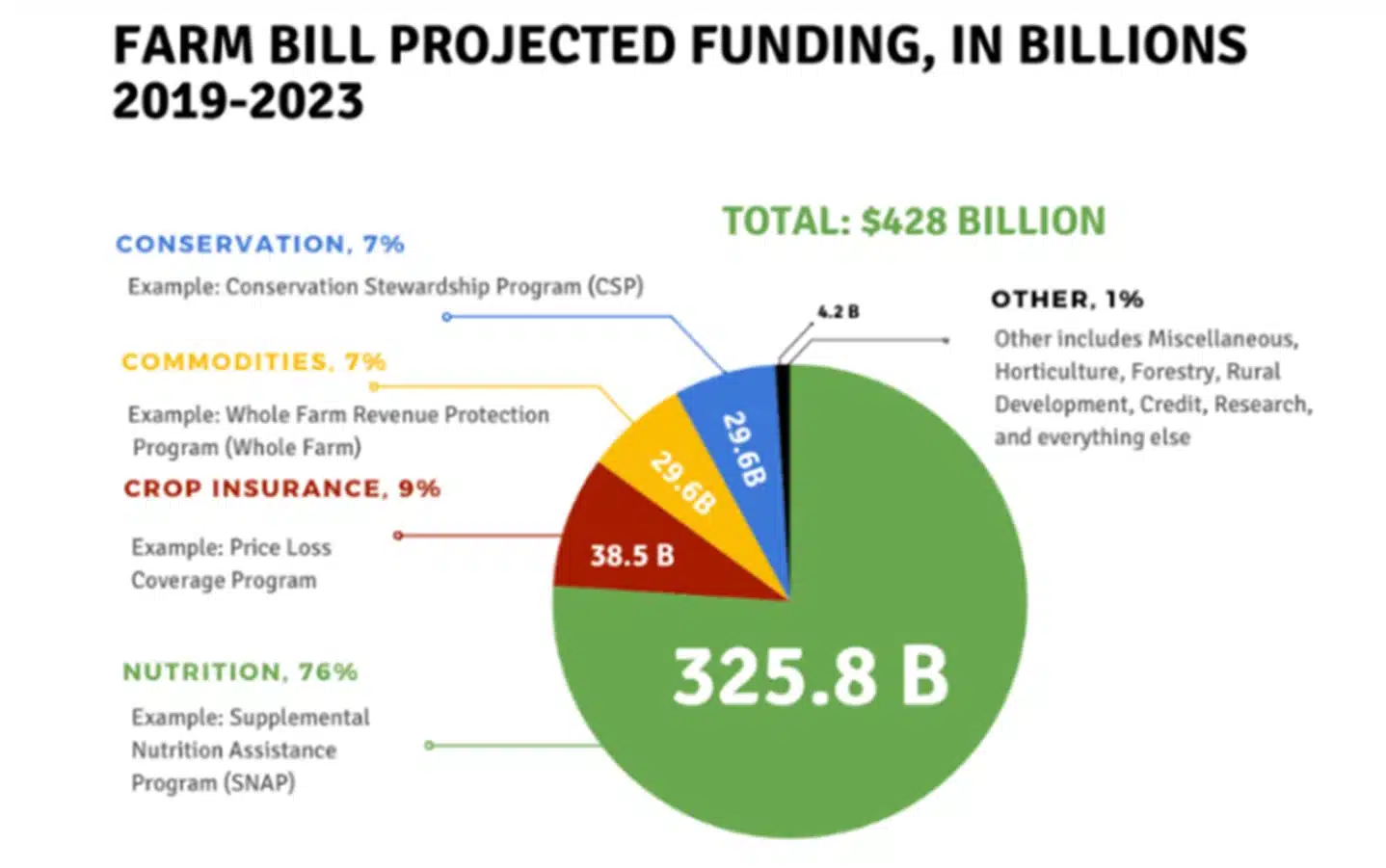
Farm Bill’s Working Lands Conservation Programs account for almost $30 Billion (or 7%) of Farm Bill spending. These voluntary programs help farmers reduce soil loss and mitigate environmental impacts through practices that support healthy soil, flood resilience, and functioning habitats. Source: USDA Economic Research Service Based on Congressional Budget Office, Direct Spending Effects for the Agriculture Improvement Act of 2018 (2018 Farm Bill), December 11, 2018 (via National Sustainable Agriculture Coalition).
There is a lot of overlap between our Mississippi River’s watershed and regions where intense agricultural and livestock operations take place in our country. Excess fertilizer from agriculture and other chemicals from our cities, run off into our rivers and result in “hypoxia” or dead zones in our local ponds, lakes, and beaches. Compounded over the entire River watershed, we see giant dead zones like the one in the Gulf of Mexico (3).
How Farm Bill Conservation Programs Help Water Quality
Programs and funding in the Farm Bill help reduce pollution by ensuring that farmers and ranchers have access to a variety of tools that help support not only healthier farms but also healthier rivers. For example, conservation programs can fund cover crop systems that keep roots in ground, leading to soil with increased organic matter and increased capacity to store flood water. Conservation programs can fund riparian buffer strips or perennial prairie strips that provide habitat for native plants and animals.
Farmers rely on the Farm Bill’s Conservation programs to help them make their farms more resilient and productive. But these programs can only help farmers if they are funded. The 2018 Farm Bill included almost $30 billion in funding for the Conservation Title and the Inflation Reduction Act of 2022 (IRA) presents an opportunity for an additional $20 billion in funding for these programs over the next 5 years. We urge Congress to protect funding for conservation in the Farm Bill and in IRA.
The Conservation Title experienced major cuts in the 2014 Farm Bill and has been subject to repeated annual cuts through sequestration and the appropriations process since then. We urge Congress to protect and increase funding for Conservation Title programs like the Environmental Quality Incentives Program (EQIP) and the Conservation Stewardship Program (CSP) in the 2023 Farm Bill and ensure IRA funding is used for climate-smart agricultural practices and Farm Bill conservation programs. This funding is critical to begin to meet the demand from farmers and ranchers in the ten Mississippi River states for these clean water and healthy habitat practices.
Further Resources
Please contact the Mississippi River Network’s Policy Director, Maisah Khan at mkhan@1mississippi.org with any questions.
- National Sustainable Agriculture Coalition (NSAC), “What is the Farm Bill?” https://sustainableagriculture.net/our-work/campaigns/fbcampaign/what-is-the-farm-bill/
- Institute for Agriculture and Trade Policy (IATP), “Still Closed Out: More progress needed to connect farmers with federal conservation programs,” https://www.iatp.org/still-closed-out
- 1 Mississippi program, “Reducing Nutrient Pollution,” https://1mississippi.org/nutrient-pollution/
Past River Citizen Advocacy Actions (inactive)
Public Petition to Restore Our Resilient Mississippi River
Public Petition to Restore Our Resilient Mississippi River
Accompanying River Days of Action is a public petition in support of our cherished River. The petition will launch at the start of River Days (June 10th) with the goal of 5,000 signatures from across the basin! Check back soon — Can the River count on you?
I support a new vision for our Mississippi River that focuses on restoration, resilience, and equity!
I care about the long-term health of the Mississippi River and the communities that depend on it. The River provides our communities so much; just a few gifts include:
- Drinking water to 20 million people in 50 cities
- River road or “flyway” for 325+ bird species
- Habitat for 780+ species.
Neither the benefits above nor the burdens (like pollution or natural disasters) brought by the Mississippi River are equitably shared. And, despite the River’s economic, environmental, and cultural importance, the Mississippi River lacks a dedicated, holistic federal restoration program. Other treasures like the Everglades, Puget Sound, and the Great Lakes already enjoy the benefits of a dedicated federal program.
Now, it’s the Mississippi River’s turn.
I support a new vision for the Mississippi River. That vision includes a holistic restoration and resiliency strategy for the River focused on four areas:
- Improving water quality,
- Restoring habitat and natural systems,
- Eliminating aquatic invasive species, and
- Building local resilience to natural disasters.
Neither the benefits nor the burdens brought by the Mississippi River are equitably shared. I support prioritizing the above restoration and resilience investments in communities of color and economically disadvantaged populations. I support efforts to make sure restoration funding is equitable and directed intentionally to River communities that have faced disproportionate harms from environmental degradation and environmental racism.
Postcards for the River
Postcards for the River
Act Now: Oppose Yazoo Pumps, Protect Clean Water Act (Closes 11/30/20)
Action Alert: Oppose yazoo pumps, protect clean water act (closes 11/30/20)
Right now, we are also considering a new threat. Clean Water Act vetoes are rare and supposed to be final. Now, the once-vetoed Yazoo Pumps Project is back and sets a dangerous precedent for the future of the CWA veto power. It weakens the power of the veto authority in the first place. It’s like a game of dominoes. If one is knocked down, others can follow. We cannot let projects that have already been vetoed because of their destructive nature back into daylight. Doing so would be a dangerous move for the land, water, wildlife, and people of not only the Mississippi River but of the nation.
August 2020 Action Alert: Thank Rep. Ron Kind for championing increased funding for Mississippi River habitat restoration, science, monitoring, and watershed study.
August 2020 Action Alert: Thank Rep. Ron Kind for championing increased funding for Mississippi River habitat restoration, science, monitoring, and watershed study.
Thank you for recently taking action on the Water Resources Development Act (WRDA) 2020 bill. Thanks to YOU, the House of Representatives passed legislation last week that includes major wins for the Mississippi River, including increased appropriations funding for habitat restoration, science, and monitoring as well as authorization for a full watershed study of the Upper Mississippi River. Increase your impact and thank Representative Ron Kind for championing these important pieces of WRDA!
It is important that our decision-makers hear from River Citizens like you, all throughout the country, who are committed to making their voice heard! Thank you for speaking up and for all that you do to protect the health and resilience of the Mississippi River.
August 2020 Action Alert: Tell Your Rep. To Support Mississippi River Restoration, Nature-Based Solutions to Flooding, and Monitoring in WRDA
August 2020 Action Alert: Tell Your Rep. To Support Mississippi River Restoration, Nature-Based Solutions to Flooding, and Monitoring in WRDA
The Water Resources Development Act (WRDA) is an important piece of legislation that directs the U.S. Army Corps of Engineers’ work on everything from flooding to habitat restoration. The House of Representatives is working on specific WRDA language today and tomorrow – make your voice heard now to support restoration, nature-based solutions to flooding, science, and monitoring!
The Upper Mississippi River Restoration Program was the first environmental restoration and monitoring program undertaken on a large river system in the United States; authorized by the WRDA of 1986. The Upper Mississippi River Restoration
Program has improved critical fish and wildlife habitat on 102,000 acres through 55 projects. The Program has also pioneered many new and innovative engineering and planning techniques for ecosystem restoration in large river systems. The science program of the Upper Mississippi River Restoration Program has developed state-of-the-art techniques to monitor and conduct research on the river. Scientific monitoring, engineering design, and environmental modeling techniques have been shared throughout the United States and in more than five countries.
But since it was founded, the Program has never benefited from a funding increase, which has reduced spending power by 53.5% since its current authorized appropriation cap was set. Luckily, the House is considering an increase in available funding for ecosystem restoration on the Upper Mississippi River. But they won’t make any new funds available for the science and monitoring part of the program. Tell your Representative now: It is time to fund big river science!
Action Alert: Submit a comment to protect the heart of U.S. environmental policy, NEPA
Action Alert: Submit a comment to protect the heart of U.S. environmental policy, NEPA
Expand the Use of Natural Infrastructure on the Mississippi River!
Expand the Use of Natural Infrastructure on the Mississippi River!
2019 has seen record floods on the Mississippi, Missouri, and Ohio Rivers and many of their tributaries. These high-water events are a vivid reminder of the role that natural systems can play in flood mitigation and river management.
Natural Infrastructure means the system of floodplains and wetlands that are part of a healthy functioning river system – these areas hold water and can help take pressure off the levee system by acting as “safety valves” for floodwaters that can threaten communities and towns.
Natural Infrastructure can help reduce the costs from flood damage and repair (and can also help clean the water by filtering and processing nutrients and sediments.) A growing number of cities and states are embracing Natural Infrastructure because of its fiscal benefits, as well as those for the environment.
Urge Congress and the U.S. Army Corps of Engineers to expand the use of Natural Infrastructure in flood policy and planning in the Mississippi River System by signing this online petition TODAY:
No More Dead Zone – Fully Fund Proven Solutions to Reduce Nutrient Pollution
No More Dead Zone – Fully Fund Proven Solutions to Reduce Nutrient Pollution
Nutrient pollution in the Mississippi River Basin negatively impacts drinking water for over 20 million people and is fueling the annual Gulf of Mexico Hypoxic ‘Dead Zone’. Record flooding in 2019 has exacerbated the problem and this year’s Gulf Hypoxic Zone is forecasted to be one of the largest on record at around 7,829 square miles (equivalent in size to the total landmass of Massachusetts!).
This problem has knowingly been going on for decades and improvement goals aren’t being met. Fortunately, solutions in agricultural conservation and management, ecosystem restoration, and improved infrastructure exist but are NOT receiving necessary funding from Congress for implementation on the scale that is required for clean water and a healthy Mississippi River.
ACT NOW TO PROTECT RIVER COMMUNITIES AND WILDLIFE!
ACT NOW TO PROTECT RIVER COMMUNITIES AND WILDLIFE!
People and wildlife along the Mississippi River are being jeopardized by construction of enormous structures in the River that raise flood levels and destroy fish habitat.
The US Army Corps of Engineers has already constructed more than 1.5 miles of structures for each mile of the middle length of the Mississippi River.
Now, they are proposing to build even more.
Let the Army Corps know you want them to take a closer look at potential harm before the River is damaged. Click here to act now.
REPEL THE REPEAL – PROTECT CLEAN WATER
REPEL THE REPEAL – PROTECT CLEAN WATER
The latest attack on clean water and our tributary streams and wetlands is underway. Your support is needed now.
Polluters and other opponents are pushing repeal of the 2015 Clean Water Rule as part of a huge assault on basic protections for clean water, including the Clean Water Act. They even are demanding that the federal government be required to ignore the economic benefits provided by wetlands.
Unfortunately, US EPA Chief Scott Pruitt has listened to polluters not the public and started the repeal process. Act now to repel that repeal.
Repeal is a massive waste of time and taxpayer money that will put the drinking water of 1 in 3 of us at risk while a much weaker rule is proposed.
They are rushing their repeal by restricting the opportunity for public comment. Act now to ensure your voice is heard by your decision makers. Click here to repel the repeal.
SAVE OUR WETLANDS – DEFEND CLEAN WATER ACT PROTECTION
SAVE OUR WETLANDS – DEFEND CLEAN WATER ACT PROTECTION
Tens of thousands of Americans joined forces to stop the environmentally devastating Yazoo Pumps project in 2008—saving 200,000 acres of wetlands along the Mississippi River that support hundreds of species of wildlife, including the threatened Louisiana Black Bear.
But some members of Congress hope to reverse this progress and put some of the nation’s richest wetlands back on the chopping block.
Take Action Now to Stop Congress from destroying vital wetlands habitat.
In a throwback to another era and contrary to federal policy, the Yazoo Pumps would drain wetlands so a handful of wealthy families could intensify agricultural production. This project would be a catastrophe for the environment and taxpayers. Senator John McCain has called this $220 million Army Corps of Engineers’ project “one of the worst ever conceived of by Congress.”
Thanks to you and many others who spoke out against the Yazoo Pumps, the U.S. Environmental Protection Agency vetoed this wasteful project in 2008. Don’t let Congress throw away this crucial victory.
Please tell your members of Congress to protect the nation’s vital wetlands, uphold Clean Water Act protections, and abandon efforts to resurrect the antiquated, wasteful, and devastating Yazoo Pumps.
RIVER POLLUTION WORSENS, ACTION NEEDED NOW
RIVER POLLUTION WORSENS, ACTION NEEDED NOW
“Decades of Delay: EPA Leadership Still Lacking in Protecting America’s Great River” is a report recently released by the Mississippi River Collaborative. It shows that federal and state officials have known of the growing severity of agricultural pollution for over 20 years, but have consistently delayed taking necessary corrective action. Instead, the Hypoxia Task Force and member states issued reports and plans with no timelines or funding for implementation. Not surprisingly, the problem has continued to grow. Can you imagine knowing of a serious problem and solutions for 20 years and not making visible progress toward stopping it??
NEW BUDGET CUTS AGAIN ATTACK OUR PROTECTIONS
NEW BUDGET CUTS AGAIN ATTACK OUR PROTECTIONS
Future generations along the Mississippi River will suffer if drastic cuts to conservation and environmental programs proposed in President Trump’s budget take place.
Sign this petition today to tell your US Senators and Representative that protecting the land, water, wildlife and people of America’s Greatest River is important to you and your family and friends. Many Members of Congress already have voiced their concerns about the President’s decimating cuts. Show your leaders that you want them to stand up for what’s important to you.
PROTECT WETLANDS THAT PROTECT US – STOP THE NEW MADRID LEVEE PROJECT
PROTECT WETLANDS THAT PROTECT US – STOP THE NEW MADRID LEVEE PROJECT
Major floods carry major amounts of water and it has to go somewhere. That is why the New Madrid Floodway was established – to allow wetlands to serve as a relief valve during large floods to protect River communities and soak up excess flood water. But these critical wetlands are in danger of being cut off from the River by a new levee.
Help us save these wetlands by stopping the New Madrid Levee Project
STOP THE BLOCK! REMIND CONGRESS THAT YOU SUPPORT THE CLEAN WATER RULE!
PROTECT WETLANDS THAT PROTECT US – STOP THE NEW MADRID LEVEE PROJECT
Some in Congress continue trying to block the Clean Water Rule. Your Senators and Representative need to hear from you again that you support the Clean Water Rule and oppose legislative and budgetary roadblocks that would prevent it from protecting our streams and wetlands.
The US EPA and the US Army Corps of Engineers diligently worked through the federal government’s normal rule-making process (click here for more information on the Clean Water Act), to release a clarifying rule that received over 800,000 comments of support, hundreds of which came from River Citizens like us.
We need to stand together against legislative or budgetary roadblocks that would prevent the Clean Water Rule from going into effect.
Unfortunately, some members of Congress continue to stop the EPA and Army Corps from doing their job and attempting to kill the Rule. We need your help again to remind Congress that you support the Clean Water Rule.
It’s easy to send a letter to your Senators and Representative showing your support for the Clean Water Rule, just enter your zip code here.
Thank you for all you do in support of clean water and a healthier Mississippi River!
REAUTHORIZE THE LAND AND WATER CONSERVATION FUND (LWCF)
PROTECT WETLANDS THAT PROTECT US – STOP THE NEW MADRID LEVEE PROJECT
LWCF is one of the most important conservation programs we have to ensure national parks, trails and monuments, many on or near the Mississippi River, are here for future generations. This bipartisan legislation has lasted 50 years bit it will expire September 30 unless Congress reauthorizes this important conservation program.
Tell your US Representative and Senators that the LWCF is should be reauthorized.
ASK YOUR REPRESENTATIVE TO BECOME A RIVER CITIZEN
PROTECT WETLANDS THAT PROTECT US – STOP THE NEW MADRID LEVEE PROJECT
As River Citizens, Congressional leaders can apply River Citizen knowledge and principals to the many avenues open to them to transform national River policy.

ASK YOUR MAYOR TO BE A RIVER CITIZEN
PROTECT WETLANDS THAT PROTECT US – STOP THE NEW MADRID LEVEE PROJECT
Devoted people, active organizations and informed local leaders—they’re all needed to make a difference in our world. Encourage River mayors to join the 1 Mississippi campaign as River Citizens.
Step 1
Become a River Citizen
Yes! The River can count on me!
I am committed to protecting the Mississippi River. Please keep me informed about actions I can take to protect the Mississippi River as a River Citizen, and send me my free e-book!, Scenes From Our Mighty Mississippi!
Step 2
LEARN ABOUT THE RIVER
We protect what we know and love. As a River Citizen, you’ll receive our email newsletter and updates, which offer countless ways to engage with and learn more about the River. You can also follow us on Instagram, Facebook, X (Twitter) , and YouTube, where we share about urgent issues facing the River, such as nutrient pollution, the importance of floodplains and wetlands, and bedrock legislation such as Farm Bill Conservation Programs.
Step 3
Take Action
There are many ways you can jump in and take action for a healthy Mississippi River. Our 10 actions list includes simple steps you can take at any time and wherever you are. Check out our action center for current action alerts, bigger projects we are working on, and ways to get involved.








